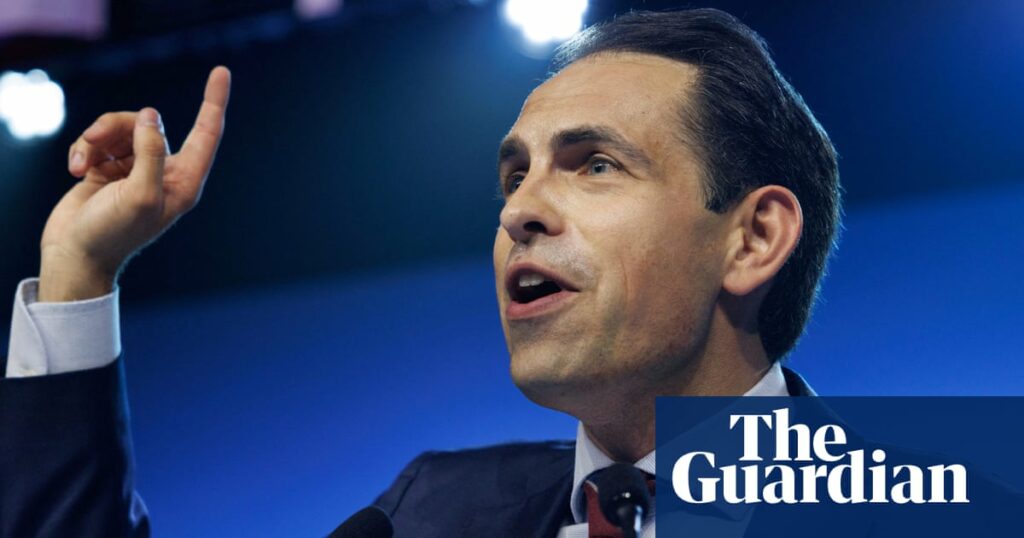A general election in Belgium on Sunday is expected to see a surge in support for a far-right party that wants to break up the country.
It is one of three elections in the country on Sunday, with the European parliamentary and regional ballots being held on the same day.
But it is the national vote that is dominating discourse in Belgium with the rise of the right in Flanders and the left in primarily French-speaking Wallonia, hinting at a potentially fiendishly complicated coalition negotiation in the weeks and months to come.
In the Dutch-speaking Flanders, the rightwing New Flemish Alliance (N-VA) is being overtaken for the first time by Vlaams Belang (Flemish Interest), a separatist and populist party that wants independence for Flanders and pursues a hardline anti-immigration policy.
Its 37-year-old leader, Tom Van Grieken, wants to turn Flanders into a breakaway state and describes Belgium as a “forced marriage” and a mishmash of “two separate democracies that have little in common”, leaving neither side with control over its destiny or its economy.
The party that has its roots in an anti-migration 1970s party, Vlaams Blok, is surging ahead in the polls under the leadership of Van Grieken, with a projected 27% slice of the votes in Flanders, up from 18% in the last general election.
It’s enough to overtake N-VA, which collapsed the last government after the then prime minister, Charles Michel, indicated he would support a UN migration pact.
Overall in Wallonia, the socialist party, PS, which won the last regional elections, is neck and neck with the liberals Mouvement Reformateur (MR), on 23% and 24% respectively, according to the latest poll by RTL Info, published on Thursday.
The Belgian Workers’ party, PTB, is projected to take 16% in Wallonia and on course to take almost just over 9% in Flanders where it is running under its Dutch name, PVDA, slightly ahead of the prime minister Alexander De Croo’s liberal party, Open Vld.
Projected results herald another potential marathon government negotiation, mirroring that in the Netherlands where elections were held in November and where there is still no formally installed government.
Last time round, Belgium broke its own 589-day record for the longest period without an elected government, with De Croo sworn in as prime minister of a seven-party government, known as the Vivaldi coalition, after 652 days.
But big gains on Sunday do not guarantee power for Vlaams Belang, which was frozen out of power in the previous government due a longstanding agreement among other parties not to work with them.
This so-called “cordon sanitaire” was imposed on its predecessor Vlaams Blok in 1989 over its plans on immigration, which rivals said breached the European convention on human rights. It has never been lifted.
A similar cordon sanitaire exists in the European parliament where far-right parties are in effect blocked by the leading conservative, centre, liberal and green parties from holding powerful positions on any committees.
skip past newsletter promotion
Sign up to Headlines Europe
A digest of the morning’s main headlines from the Europe edition emailed direct to you every week day
Privacy Notice: Newsletters may contain info about charities, online ads, and content funded by outside parties. For more information see our Privacy Policy. We use Google reCaptcha to protect our website and the Google Privacy Policy and Terms of Service apply.
after newsletter promotion
The question facing the Belgian parliament on Sunday will be whether a democratically elected party with a high share of the vote can justifiably be locked out of power.
Benjamin Biard, the head of research at the Centre de recherche et d’information socio-politiques, said: “As long as the government is based on a majority in parliament there is no reason why this should be inherently undemocratic.”
He added that while Vlaams Belang had never been in power at local, regional or federal level because of the cordon sanitaire agreement made by the mainstream parties 30 years ago, N-VA had never ratified that pact. “Its president is sometimes ambiguous on the issue. If together they win more than half the seats in the Flemish parliament, they could possibly join forces.”
He said this was “far from guaranteed” because this could exclude it from a potential federal government, with several French-speaking parties already announcing they will not work with anyone who works with Vlaams Belang.
On Sunday De Croo, a liberal, closed the space for Vlaams Belang further, hinting at an alliance with N-VA. While the current coalition of liberals, Christian Democrats, socialists and greens had “governed well”, he said, it was now time for the centre-right parties to unite after the election.
The leftwing parties in the Vivaldi coalition immediately hit out, with the Greens’ Petra de Sutter saying she was disappointed by De Croo, arguing that the only way to avert “social demolition” was to form a progressive bloc after the election.
Source link : https://www.theguardian.com/world/article/2024/jun/08/belgium-general-election-european-elections-vlaams-belang
Author :
Publish date : 2024-06-08 03:00:00
Copyright for syndicated content belongs to the linked Source.
